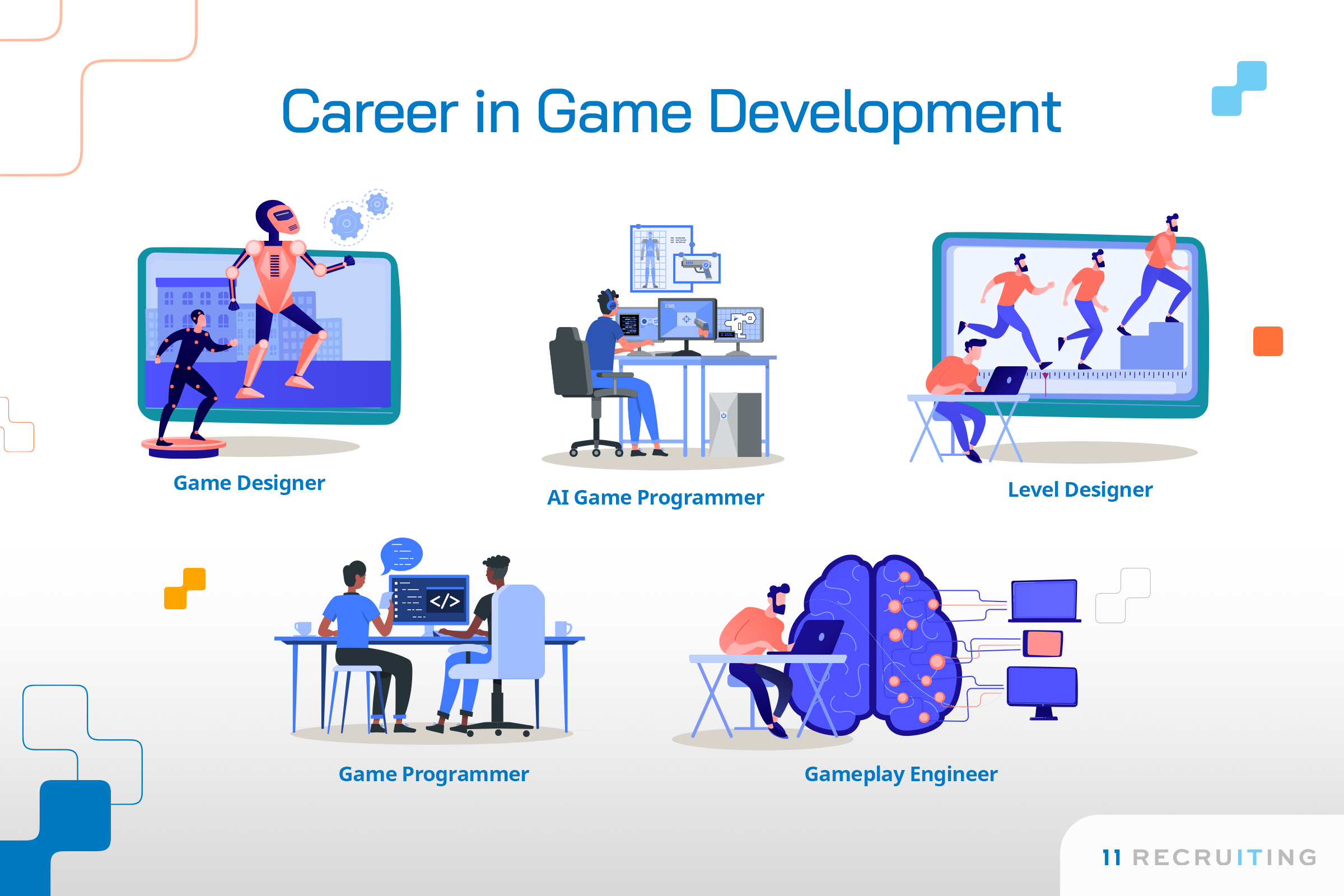
Is starting a career in the game development industry a dream of yours? Well, if you have a degree in IT or computer science, or a good working experience as an IT professional , then you’re already one step there.
But even if you don’t have relevant experience, we’ll tell you exactly how to become a game developer and detail the skills needed to be successful in the field. We’ll also detail the path you need to take to increase your chances of getting a lucrative career in this multi-billion dollar industry.
What is the Role of Information Technology on Video Game Development?
As technology progresses and becomes sophisticated, there is an increasing need for professionals with an IT background.

Here are some of the latest technologies that power video games today:
- Game Engines – A game engine is a software framework used to develop games. If you have a degree in computer science, you can get a job programming these engines.
- Audio Engines – These tools are responsible for creating sound effects in video games. If you have a love for music and games, then you can start your career in the field by getting a degree in audio engineering.
- Artificial Intelligence – Artificial intelligence in games is responsible for the seemingly responsive and intelligent behaviors of Non Playable Characters (NPCs). Those of you who have a computer science background will be a perfect fit for AI jobs.
- Augmented Reality – Augmented reality mixes the real world with in-game visual and audio elements to create an immersive experience. To get into the industry, a coding background and understanding of different programming languages is a must.
- Cloud Gaming – Cloud gaming allows you to play video games on multiple devices without downloading the game on each device. Instead, the game is run and streamed from a server through an internet connection. Cloud engineers will be highly in demand in the coming years and those with a bachelor’s degree in computer science are perfect candidates for the job.
If you have a background in programming, IT, or computer science, you have all the foundations to start a fantastic career in game development. You can also find careers here.
1. Game Designer
Game designers are the creative players in the team. They are responsible for setting up the world, characters, storylines, mood, and tone of the game. They create the game’s initial concept and keep a hand on the creative wheel till the end of the development cycle.
Roles and Responsibilities of a game designer:
- Come up with the game concept, plotline, character designs, and game objectives
- Direct in-game cutscenes and action sequences
- Devise the rules of a game
- Collaborate with programmers to implement their creativity
- Look after quality and keep the game in line with the original vision
Skills required by a game designer:
- Programming
- Creativity
- An analytical mind
- Technical knowledge
- Knowledge of the gaming industry
How to Become a videogame designer:
Experience is king, and if you have a portfolio that shows the games you’ve developed, it will be worth more than any degree. However, if you don’t have a portfolio, you can take some courses. The following degrees are also valuable
- B.Sc in Computer Science,
- B.Sc in Graphics, Animation & Gaming.
- Advanced Diploma in Game Art & 3D Game Content Creation
- Certificate in Game Art & Design
2. AI Game Programmer
An AI programmer is responsible for simulating intelligence of in-game enemies. They program enemy tactics, movement patterns, and strategy. In the past, gaming AI was rudimentary, however game companies like Ubisoft are investing in the field to take AI gaming to the next level.
Roles and Responsibilities of an AI game programmer:
- Collaborate with designers and developers to come up with an AI plan
- Research and create AI elements
- Collaborating with game testers to identify bugs
- Set up parameters and patterns that govern the rules of the game
- Program enemy and Non-playable character (NPC) AI.
Skills Required by an AI game programmer:
- Knowledge in artificial intelligence
- Creative, abstract, and critical thinking
- Experience in writing algorithms and knowledge of advanced math and physics
- Understanding of psychology
- Knowledge of deep learning and neural networks
- Knowledge of automation scripts
How to become an AI Game Programmer:
To become an AI game programmer, a master’s degree in game design is a requirement . You also need many years of experience being a general gaming programmer before advancing into AI game programming.
3. Level Designer
As the name suggests, a level designer uses design and production skills to create virtual environments for video games. Often, this role entails working closely with artists, animators, and other producers to create the game’s levels.
An experienced level designer is also a user-experience expert who can balance design and production skills with programming knowledge to create fun, immersive, and memorable experiences in video games and virtual reality worlds.
Roles and Responsibilities of a Level Designer:
- Create the level structure for the game
- Sketch and design each level
- Design the levels based on action sequences in the game
- Make sure levels remain within gameplay constraints
- Coordinate with artists to visually create well-constructed maps
- Create levels that facilitate storytelling and facilitates an appropriate mood
Skills Required:
- Programming ability
- Creativity and artistic talent
- Understanding of architecture
- Proficiency in using 3D modeling software
How to become a Level Designer:
A degree in graphic design or computer science boosts your chances of starting a career in the field. Level designers also need to be creative and understand level design. Someone who has a solid architectural background has an edge over those who do not.
To get an entry level game developer job as a level designer, work on customs mods and levels for customizable games. These will serve as great portfolio pieces when you go for an interview in a company.
4. Game Programmer
Game programmers are responsible for writing the code of a video game. They usually write codes to interface with components like graphics and artificial intelligence, but the bulk of coding is generally related to controlling what happens within the game.
Roles and responsibilities of a Game Programmer:
- Optimize the game to work at its best capability
- Debug and troubleshoot the game
- Collaborate with team members to develop the game
- Makes sure the game meets performance requirements
- Work with the development team to problem solve and fix technical issues
- Create prototypes in the early phase of the gaming lifecycle
- Provide tech support after the game launch
- Work on upgrades and patches post-game launch
Skills Required for a Game Programmer:
- Knowledge of programming languages
- Knowledge of animation software
- Great communication and interpersonal skills
- Ability to be a team player
- Creative problem-solving capability
- Ability to meet tight deadlines
How to Become a Game Programmer:
Although a degree is not required, it’s generally preferable. Talent is the most important asset in the industry. You’re better off than a degree holder who is terrible at coding if you have good programming skills and a passion for gaming. However, if you do plan to get a degree, get one in Computer Science, Software Engineering, Math and Physics, or Computer Game Development.
Knowledge of C and C++ is essential. Knowledge in Java is useful for developing mobile game applications. For iOS games, Objective-C and Swift are required language learning.
5. Gameplay Engineer
Gameplay engineers work on the game engine (the underlying system that makes things happen in the game). Gameplay engineering is generally considered one of the more challenging jobs in video game development. The engine usually has to handle any situation while running at a good speed, so the code must be highly efficient and use as few resources as possible.
Roles and Responsibilities:
- Coordinate with game designers and developers on the technical difficulties and requirements of the game
- Work with programmers and animators to increase software efficiency.
- Testing the game for smooth gameplay and good user experience
- Improving software efficiency
- Collaborating with all teams to fix technical issues.
Skills required by a Gameplay Engineer:
- Problem-solving capability
- Programming knowledge
- Capability to code custom software tools
- The ability to be a team player
- Great interpersonal skills to work with a team
- An analytical mind
- Knowledge of the advancements in the gaming industry
- Ability to debug software and integrate platforms
How to become a Gameplay Engineer:
Getting a bachelor’s degree in Computer Science or Game Design and Development is recommended. These programs teach you data structures, Java programming, game software development, interactive narratives, and artificial intelligence.
After that, it would be ideal to get an entry level game developer job or an internship to kickstart your career. Also work on different gaming projects to show your competence. Make sure you keep up to date with current video game technology and programming developments.
6. Sound Designer
A video game audio engineer, commonly referred to as a sound designer, is the person who designs and implements all of the sound effects and musical compositions for a video game. They also work on programming-related stuff. For instance, if there’s a huge monster breathing fire at your character out in the distance, the audio engineer makes sure you hear the sound when it comes into range.
Roles and Responsibilities of a sound designer:
- Ensures the tone and mood set by the music is in line with the game vision
- Use sound effects libraries to create the right music
- Work with other development team members to make sure they implement sound effects and compositions in a timely manner
- Ask for assistance from programmers to program in-game music and sound effects
- Work directly with 3D designers and level designers to identify areas requiring different kinds of background music.
Skills required by a sound designer:
- Experience using industry software like Pro Tools, Reaper, Wwise, and FMOD
- Experience audio editing, processing, synthesis, and mixing of sound effects and dialog
- Must have good communication skills to collaborate with other team members
- Good grasp of music
- Creativity
How to become a sound designer:
Most sound designers get a bachelor’s degree in audio engineering or a related field. Becoming a sound designer isn’t easy, so it is recommended you create an impressive portfolio so you can stand out from other applicants.
Frequently Asked Questions
Is it hard to get a job in the gaming industry?
Yes, the unfortunate truth is that it is difficult to get a job in the gaming industry. It’s a competitive field. But if you have a degree in a relevant field and can make a strong portfolio, then your chances of getting your first job increases.
Is the gaming industry a good career choice?
The gaming industry is a great career choice, especially if you have the right skills for the role. However, it is important to note that the field is competitive, with long hours and stressful work environments. So it’s ideal to have a passion for making video games.
Does the gaming industry pay well?
Jobs in the gaming industry pay very well. However, keep in mind that different companies have different salary scales, and how much you earn depends on your experience and skill level.

